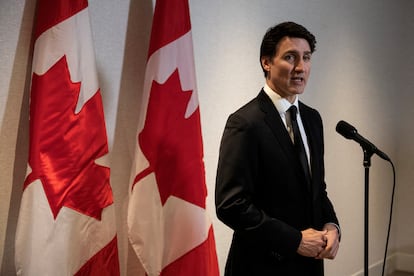Trudeau’s resignation creates new challenges for Mexico in USMCA review
Sheinbaum’s government is confident that the benefits of the trade agreement and pragmatism will ultimately outweigh the conservative shift and anti-Mexican rhetoric in Canada

“I want to put my country first.” “There is crime and chaos in our streets.” “I will do whatever it takes.” These statements are not from U.S. president-elect Donald Trump, but from Pierre Poilievre, the frontrunner in Canada’s polls. Justin Trudeau’s resignation has triggered a race for his successor, opening up a host of uncertainties regarding the impact on the North American political landscape, already shaken by Trump’s return to the White House on January 20. Poilievre, the conservative candidate with a double-digit lead in voting intentions and dubbed the “Canadian Trump,” has raised new doubts about the future of the North American free trade agreement (USMCA), whose review was formally set to continue until 2026 but has been accelerated by the new political cycle in the U.S.
The Mexican government has dismissed the idea that the election of a new Canadian leader could jeopardize the agreement’s review, expressing confidence that it remains in the best interests of both Ottawa and Washington. “I have always said that the trade agreement between the three countries has benefited all three countries,” Mexican President Claudia Sheinbaum said at her morning press conference on Tuesday. “It is up to the people of Canada to decide who will be their prime minister. Until that election takes place, we will not be offering an opinion,” Sheinbaum concluded, regarding Poilievre’s rise and the political uncertainty coming from the north.
The most immediate effect of Trudeau’s resignation is that attention in Canada will be almost entirely consumed by his succession and upcoming elections. In the meantime, the reins of the country will be in the hands of provisional authorities, lacking popular legitimacy and focused on relatively minor issues.
“In the short term, there will be no leadership that can address the challenge posed by Trump’s return to power,” said Julián Durazo-Herrmann, an academic at the University of Quebec in Montreal. “In this context, everything else, including the relationship with Mexico, will take a backseat,” added the political scientist.
Trump’s influence has also been felt in Canada. Just weeks after his election victory, the Republican threatened to impose tariffs on the country, as he did with Mexico, and considered the possibility of splitting the USMCA into two separate treaties: one negotiated with the U.S. authorities and another with the Mexican government. Trudeau clashed with Sheinbaum over the possibility of such an approach, but Poilievre has embraced it. “I only care about Canada, I want to put our country first,” declared the leader of the Conservative Party, echoing one of Trump’s most well-known slogans. “We have more trade with the United States than with the rest of the world combined. I will do whatever it takes to preserve and protect that relationship above all others,” he said in late November.
In the same message, Poilievre sent other signals to court Trump and argued that he was within his rights to prioritize the interests of his country. “President Trump has the right to put his workers and his nation’s security first. I will put Canada’s workers and Canada’s security first” he added. The Canadian politician, with a populist profile and ties to ultraconservative groups, has targeted Trudeau over issues like immigration and the strain on Canada’s reception system, and last year even advocated for the reimposition of visas for Mexican visitors. “His stance toward Mexico has never been very friendly, at least rhetorically,” explained Durazo-Herrmann.
However, the ideological closeness between Trump and Poilievre offers little reassurance to Canada. The idea of annexing Canada and turning it into the “51st state” of the United States — once a recurring joke — remains alive, with many questioning whether it’s a serious threat. This has sparked a unified rejection among major political players in the country. Poilievre, despite his nationalist rhetoric, now finds himself struggling with a difficult balancing act. “Canada will never be the 51st state. Period,” he said in a message on X, while also affirming, “We are the best friends to the U.S.” He has also promised to rebuild the military and “take back control of the border” to “keep Russia and China out.”
“Canada does not seem to have deciphered Trump, and the lack of political leadership only makes things worse,” said Durazo-Herrmann.
Statements by nationally prominent figures, such as Ontario Premier Doug Ford, who called it an “insult” to be compared to Mexico, and the growing ties of figures like Alberta Premier Danielle Smith, who visited Mar-a-Lago last weekend, have raised questions in Mexico about where Canadians truly stand on regional policy issues. However, Sheinbaum’s government has steered clear of provocations, reiterating twice in two weeks that it is not concerned about a potential policy shift from Canada.
Durazo-Herrmann agrees with the Mexican authorities’ assessment. The expert notes that while comparing Poilievre to Trump is valid, the Canadian leader doesn’t have the same tight control over his party. He argues that Poilievre’s coalition of allies is not as far to the right as that of Trump’s in the U.S. Furthermore, Durazo-Herrmann emphasizes that Canada shares two key traits with Mexico: it understands that its most important relationship is with the United States and that it has significantly less weight in the international system.
These similarities were crucial during the negotiations of the USMCA under Trump’s first presidency, as Mexico and Canada formed a united front to counterbalance Washington’s power. “It’s a movie we’ve already seen,” said the political scientist, predicting a similar scenario in the treaty’s revision. “Despite the anti-Mexican rhetoric and internal political messaging, Canada will eventually have to accept that it is not in a position to negotiate from a place of strength, and that a trilateral agreement is far more viable.”
Despite the grandiose official speeches and recent misunderstandings, Durazo-Herrmann’s long-held thesis is that the relationship between Mexico and Canada is driven by pragmatism, and he hopes this will persist despite the turbulence. “Canada is very defensive, and Mexico is not on its list of priorities,” said the expert.
Starting next Monday, the first uncertainties about Trump’s impact in North America will begin to be cleared up, with migration, the war on drugs, and trade as open issues for Mexican authorities. However, the question regarding Canada, the third party at the negotiating table, will likely take a few more months to be clarified.
Sign up for our weekly newsletter to get more English-language news coverage from EL PAÍS USA Edition
Tu suscripción se está usando en otro dispositivo
¿Quieres añadir otro usuario a tu suscripción?
Si continúas leyendo en este dispositivo, no se podrá leer en el otro.
FlechaTu suscripción se está usando en otro dispositivo y solo puedes acceder a EL PAÍS desde un dispositivo a la vez.
Si quieres compartir tu cuenta, cambia tu suscripción a la modalidad Premium, así podrás añadir otro usuario. Cada uno accederá con su propia cuenta de email, lo que os permitirá personalizar vuestra experiencia en EL PAÍS.
¿Tienes una suscripción de empresa? Accede aquí para contratar más cuentas.
En el caso de no saber quién está usando tu cuenta, te recomendamos cambiar tu contraseña aquí.
Si decides continuar compartiendo tu cuenta, este mensaje se mostrará en tu dispositivo y en el de la otra persona que está usando tu cuenta de forma indefinida, afectando a tu experiencia de lectura. Puedes consultar aquí los términos y condiciones de la suscripción digital.









































